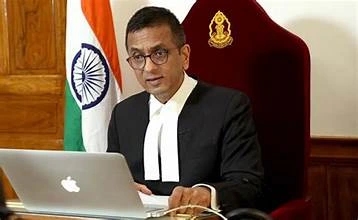Chief Justice of India DY Chandrachud has revealed that the issue regarding the appointment of judges was dealt with maturity by both the Executive and the Judiciary.
Speaking during the Loksatta Lecture at Mumbai University on Saturday, he said the CJI has to be in dialogue with the Law Minister and see if the objections regarding a particular candidate were justified.
Sometimes a consensus emerged on a particular candidate, at other times, it may not. This showed the strength of the system, noted the CJI, adding that a great deal of maturity was shown at different levels by both the Judiciary and the Executive on the issue.
Speaking about meetings between the members of Judiciary and Executive, he said such parleys were never held to discuss judicial work being done by judges but for administrative or social purposes.
When the Judiciary and the Executive engaged, it created a perception that deals were being made. However, these interactions were only part of a robust dialogue between different arms of the government, he explained.
Speaking about the tradition that the head of a State or Union Territory was always in a consultative process with the head of the Judiciary of the State or the Supreme Court, the CJI said that the discussion was never about the pending cases because the judiciary was completely independent on that front.
There was a great deal of deference to the judiciary even in the political class, which showed the maturity of the political system, he added.
Speaking about his tenure as Chief Justice of the Allahabad High Court and as a member of the administrative committee in Maharashtra, the CJI said it was customary for the Chief Minister to visit the residence of the Chief Justice, and vice versa.
Agendas were set in advance for such meetings, which included infrastructural or IT projects, their priority and funding.
Replying to a question related to the controversy arising out of Prime Minister Narendra Modi’s visit to the CJI’s residence during the Ganesh festival, he said that since the Executive handled judicial budgets, meetings between a Chief Minister and a High Court Chief Justice are necessary.
A Chief Minister never discussed a pending case with the Chief Justice because it operated in a completely different sphere. The administrative relationship between the High Court and the State government was different from the judicial work done by the judges. Even at the Central level, the administrative relationship between the Supreme Court and the government of the day was very different from the judicial work taken up by the judges.
Regarding democratic institutions, the CJI said that it was easy to criticise the institutions formed over the last 75 years. Every institution had its positive characteristics and was capable of betterment. However, the scope for institutional improvements should not imply that there was something fundamentally wrong with the institution. It was only being done to develop a better system, he added.


